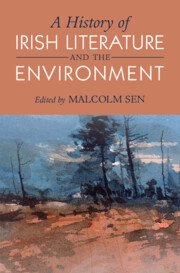Book contents
- A History of Irish Literature and the Environment
- A History of Irish Literature and the Environment
- Copyright page
- Contents
- Figures
- Tables
- Contributors
- Introduction Culture, Climate, Capital, and Contagion
- Chapter 1 Landscape and Literature in Medieval Ireland
- Chapter 2 The Irish Annals and Climate, Fifth–Seventeenth Centuries CE
- Chapter 3 The Environmental Vocabulary of Irish Folklore
- Chapter 4 Narratives of Arboreal Landscapes
- Chapter 5 Famine and Ecology, 1750–1900
- Chapter 6 Political Ecology in Nationalist Literature, 1880–1922
- Chapter 7 Solastalgic Modernism and the West in Irish Literature, 1900–1950
- Chapter 8 The Ecology of the Irish Big House, 1900–1950
- Chapter 9 Refuge and Domestic Space in Northern Irish Poetry, ca. 1940–Present
- Chapter 10 Irish Travellers, the Environment, and Literature
- Chapter 11 The Oceanic Imaginaries of Modern Irish Writing
- Chapter 12 Landscape in Irish-Language Literature: Poetry and Prose, 1900–2000
- Chapter 13 Poetry and Place
- Chapter 14 Animals and Climate Crisis in Irish Poetry
- Chapter 15 Animals and Animality in Irish Fiction
- Chapter 16 The Political Ecology of Food and Hunger, 1950–Present
- Chapter 17 Built Environments and Lived Ecologies in Contemporary Irish Poetry, 1998–Present
- Chapter 18 Transnationalism and Environment in Contemporary Irish Literature
- Chapter 19 Energy Futures in Contemporary Irish Fiction
- Bibliography
- Index
Chapter 15 - Animals and Animality in Irish Fiction
Published online by Cambridge University Press: 14 July 2022
- A History of Irish Literature and the Environment
- A History of Irish Literature and the Environment
- Copyright page
- Contents
- Figures
- Tables
- Contributors
- Introduction Culture, Climate, Capital, and Contagion
- Chapter 1 Landscape and Literature in Medieval Ireland
- Chapter 2 The Irish Annals and Climate, Fifth–Seventeenth Centuries CE
- Chapter 3 The Environmental Vocabulary of Irish Folklore
- Chapter 4 Narratives of Arboreal Landscapes
- Chapter 5 Famine and Ecology, 1750–1900
- Chapter 6 Political Ecology in Nationalist Literature, 1880–1922
- Chapter 7 Solastalgic Modernism and the West in Irish Literature, 1900–1950
- Chapter 8 The Ecology of the Irish Big House, 1900–1950
- Chapter 9 Refuge and Domestic Space in Northern Irish Poetry, ca. 1940–Present
- Chapter 10 Irish Travellers, the Environment, and Literature
- Chapter 11 The Oceanic Imaginaries of Modern Irish Writing
- Chapter 12 Landscape in Irish-Language Literature: Poetry and Prose, 1900–2000
- Chapter 13 Poetry and Place
- Chapter 14 Animals and Climate Crisis in Irish Poetry
- Chapter 15 Animals and Animality in Irish Fiction
- Chapter 16 The Political Ecology of Food and Hunger, 1950–Present
- Chapter 17 Built Environments and Lived Ecologies in Contemporary Irish Poetry, 1998–Present
- Chapter 18 Transnationalism and Environment in Contemporary Irish Literature
- Chapter 19 Energy Futures in Contemporary Irish Fiction
- Bibliography
- Index
Summary
This chapter charts a transhistorical narrative to analyze the evolving permutations encoded within human–animal binarisms. Maureen O’Connor argues that “The native Irish were long believed to have powers of human–animal metamorphosis.” O’Connor states that the Welsh clergyman Giraldus Cambrensis, and later Edmund Spenser in his View of the Present State of Ireland, “claimed that the Irish regularly turned into wolves.” Interestingly, in the late nineteenth century “various threats to the status quo, including feminists and Fenians, were figured as werewolves. Following the Great Hunger and the subsequent rise of Fenianism, which agitated for Irish independence often through acts of violent terror, the image of the threatening Irish animal became ubiquitous in English culture.” O’Connor is especially alert to the gendered dimensions to such discourses, making visible the transformation of the dyadic relationship between animality and femininity that stretches from early Irish writing to colonial and postcolonial deployments.
Keywords
- Type
- Chapter
- Information
- A History of Irish Literature and the Environment , pp. 298 - 316Publisher: Cambridge University PressPrint publication year: 2022

